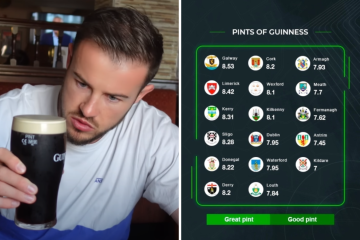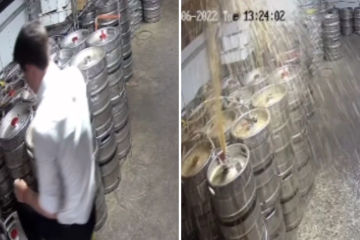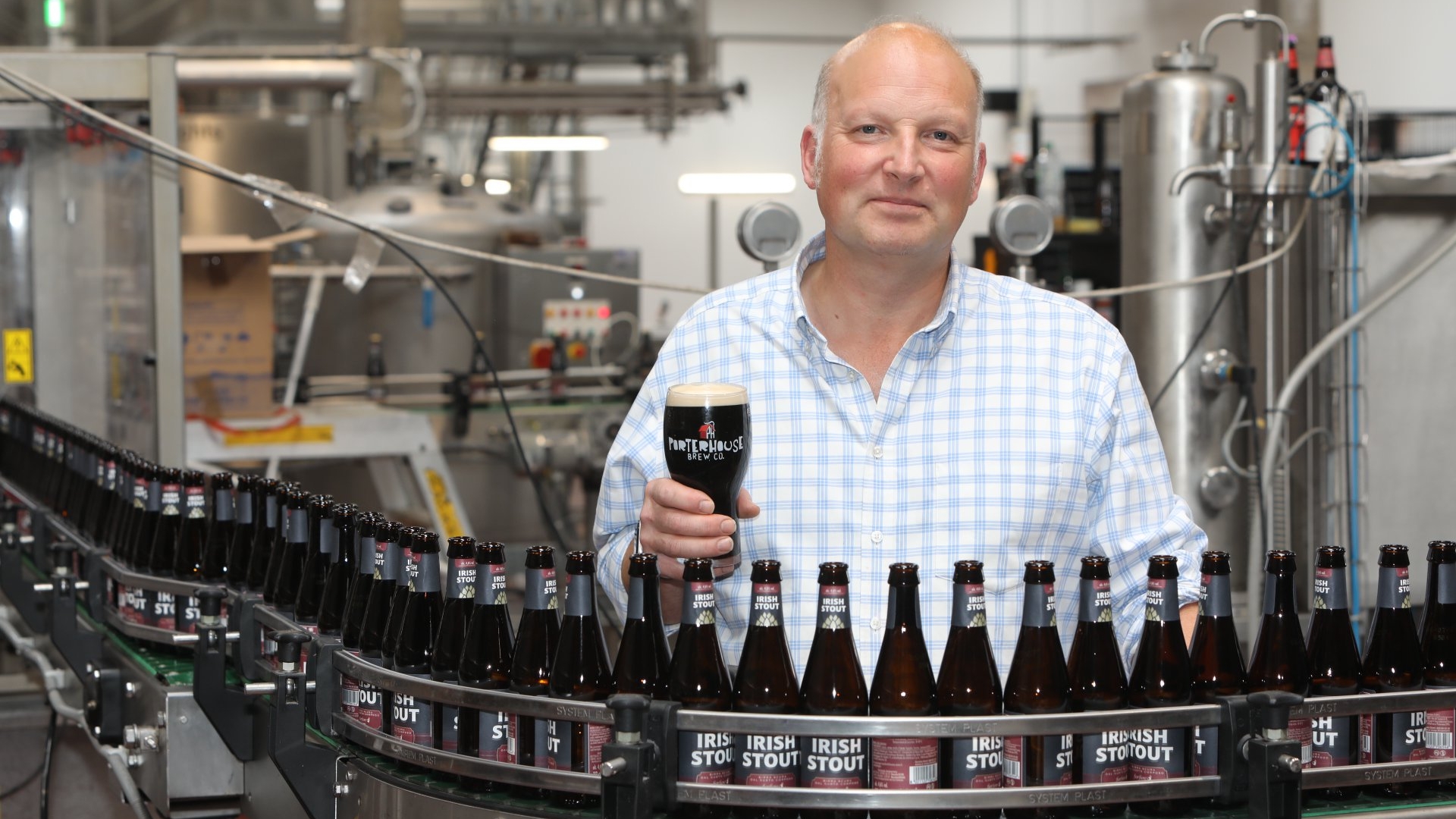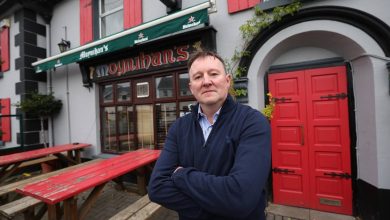TOURISTS lured to Ireland by the ‘craic’ will soon see dire cancer warnings on the beer they have come to drink, it is claimed.
New laws requiring drink manufacturers to issue warnings about cancer, liver disease and pregnancy are in the works and are currently under consideration in Europe.

6

6

6
For Drinks Ireland chairman Peter Mosley, whose industry is slowly emerging from two tough years, it’s another headache they could do without.
He told the Irish Sun: “When people come to Ireland they will be bombarded with this message, Irish products are potentially carcinogenic, while their national beers are not.
“It doesn’t really help us in any form.
“We spend a lot of time and money marketing the drinks industry, the craic, the bars, the big brands here spend a lot of time highlighting their heritage and their place in Irish society.


“People come to Ireland to enjoy it. It is therefore potentially counterproductive. It will be some time before we see the full impact of this.
He also fears that by imposing label warnings on foreign producers they will not care about the “headache” and will “send their pallets of wine elsewhere”.
Ireland is the only one to move, hailed by Alcohol Action Ireland but derided by another beer producer as “idiot”.
BORED
Rascal’s brewery in Dublin only opened in 2014 but has exploded in popularity, building on its success at its new Inchicore base where, according to marketing chief Joe Donnelly, very traditional pubs in the “working class” adopted them.
Most read in The Irish Sun
However, he too is annoyed with labeling laws that are still a few years away, adding: “We will soon have cancer warnings on labels, but that won’t apply for export.
“It shows how silly it is, the cancerous drinks we serve here in Ireland and the cancer free drinks we send overseas. It’s just stupid and doesn’t make any sense.”
He is not a fan of the Public Health Alcohol Act which also includes minimum unit prices on alcohol and the new partitioning of alcohol aisles in supermarkets.
Based in part on similar movements in Scotland, a report by the British Medical Journal Open in July suggested that the MUP may not work as hoped for those most at risk or young drinkers.
SOCIAL PROBLEMS
A separate report from a Scottish addictions group found that the MUP was driving some drinkers to cheaper illicit drugs.
Donnelly said: “I disagree with a lot of things, we have seen several reports now that the MUP failed in Glasgow and it will fail here.
“The saloon doors separating licenses and supermarkets etc, I think this is largely a misplaced nanny thing, it won’t work.
“I don’t deny that we have a lot of social problems caused by alcohol abuse in this country, I’m not an eejit, but I don’t agree with the methods of the current government.
“There’s a very strong anti-alcohol sentiment there and I don’t really understand why.
“Over the last few years, despite measures that weren’t because of, Ireland has been addressing it socially anyway.
“We are in the middle of the EU per capita consumption chart.
‘EXCEPTIONAL’
“Our rates of teenage drinking are plummeting. I don’t know why these laws were all necessary. Do they appeal to a certain sector of the electorate? Is this grandstanding?”
AAI insists, however, “These national labeling regulations recognize that citizens have a right to know of the inherent risk of alcohol consumption – a right currently denied.”
According to the OECD, the Irish drank an average of 9.5 liters of pure alcohol per person in 2021, which puts us at 20e in the world where European nations dominate.
Mr Mosley is also the boss of the Porterhouse Brewing Company, an independent brewer which began operating in Ireland in the mid-1990s, when the country was barely ready for a beer revolution, opening its own bar in the Temple Dublin bar, which is still in operation today.
He said: “Ireland has been a little slow to get into craft beer.
“The UK and the US have been growing since the 1980s. When we started here, the skepticism was enormous.
“People generally thought it was a flash in the pan and some people said we’d be selling Guinness in a few days from the bar in Parliament Street.”
NOT JUST FOR GEEKS
That never happened, and there are now more than 70 independents producing hundreds of variations of beers and stouts, which Donnelly says is “not just the domain of geeks, nerds or pretentious types”.
But with just 2% of the beer market, smaller players are dwarfed by multinational giants such as Diageo – which produces Guinness – and Heineken.
As demand for craft beer grows, Ireland remains obsessed with brands – drinkers are still much more likely to order a Guinness than a stout unlike in the UK where, according to Mr Mosley, it’s still a “pint of bitter”.
Joe says, “It’s really hard to convince someone to switch from Guinness to Heineken, let alone an IPA or a locally brewed stout.
It is also difficult for the smaller players to face the larger ones who often have the majority of tap dancing in the pubs sewn up.
Joe said, “It’s hard to get the product out there. Having it handy is one thing, keeping it there is another.
“You could convince a publican to have one of your beers, here’s our best seller and he’ll be like, give me a tap. You could come a month later and he’ll be like ‘ah, that didn’t really turn out sold well”. What do you say? You know it’s a good beer, it’s a hard beer.
WE MUST COMPETE
He added: “There are elements of (the giants blocking taps) but you have to deal with that.
“You might come in and the publican will say ‘look at this big nameless brewery came in and said we’ll give you new patio furniture or an awning or some extra kegs and that’s it’.
“But,” I said, “this is the playground as it is.” That’s not going to change, so rather than complaining about it, we’re going to have to work around that and see how you can compete.
Peter, who represents major brewers as well as the biggest independent producers as chairman of DI, says getting beer into pubs is all about knocking on doors and hoping for space.
He added: “Anecdotally, the feeling is that it’s harder these days to get lines in bars.
“The brewing industry hasn’t really received support from the state like hospitality has during lockdown, we’ve found that very difficult.
“IT’S JUST BUSINESS”
“The big brewers were very good at supporting the publicans, but it might come at a cost. Then they want their pound of flesh.
“Which we cannot regret. A lot of small brewers tend to be very upset, but that’s just business.
“If we could, we probably would too. But this potentially limits the availability of local independent brewers.
“We believe that publicans are being pressured or encouraged not to stockpile or not quite have the range that they could have had.”
The challenges are many – including the second highest excise rates for beer in Europe, the feeling that the culture of post-work pints may be fading, the skyrocketing cost of producing beers and even the battle for retailer shelf space.
But Ireland is slowly moving towards alternatives to ‘black or gold’ and producers see a lot of hope for the future as tastes change.
Donnelly said: “There has always been an absolute belief that together, united as an industry, we have a much better chance of gaining market share, taking on conglomerates and surviving than if we compete. the ones with the others.
“We take care of each other, we help each other, we support each other in brewing and beers.”
He added, “The United States is currently targeting a 20% market share for craft beer over the next few years.
“Their market is so much more mature and evolved than ours. Barring some sort of major disaster, we can only go up through our collective efforts and eat away at that share.
“In the US market, Bud is iconic, but craft beer is now in serious demand at 20%, which shows what can be done and it’s an exciting proposition.”
A BEER FOR ALL
Peter insists: “People’s drinking habits have changed, they are more open to the idea of craft beer, embracing various IPAs that they may not have made before.
“It’s just patience. We’re selling more beer now, we’re not sure we’re going back to pre-pandemic levels, but we’re seeing a lot more beer moving around, more and more of those volumes are new or contemporary styles.
“People have traveled the world, they’ve seen that beer doesn’t have to be black or golden, it can be sour or sweet, aromatic with hops, flavored with fruit. It’s still beer and satisfying.
“There’s a beer for everyone, you just have to find it.”
We have contacted Health Minister Stephen Donnelly for comment.

6

6

6
#Small #brewers #relish #battle #Guinness #Heineken #Govt






